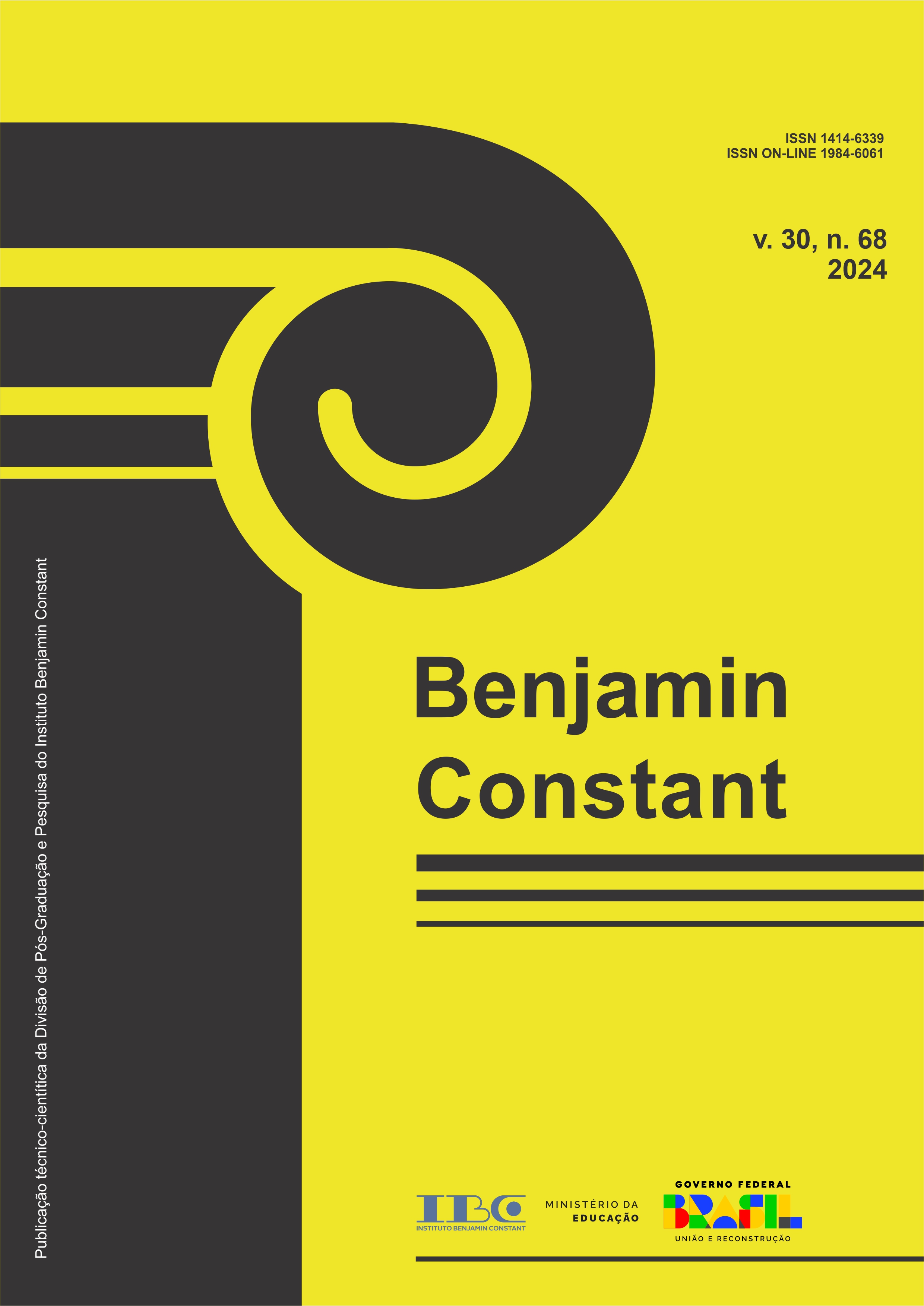The discourse on public policies related to the education of people with visual impairments in the first Brazilian Magazine for the Blind (RBC)
Abstract
The present study was dedicated to analyzing the discourse of the first copy, published in 1942, of the Brazilian Magazine for the Blind, a Braille periodical from the Benjamin Constant Institute. Upon initial reading, it was noticed that the publication presents content about public policies of the time, related to the education of people with visual impairments, the effects of which will be observed decades ahead. From then on, the aim was to reconstruct, through the discursive marks present in the periodical, the memory of current policies, reflected in the magazine’s pages. There were three public policies used in the observation, produced by the Federal Executive Branch for application nationwide: National Policy on Special Education (Brasil, 1994); National Policy on Special Education from the Perspective of Inclusive Education (Brasil, 2008); and National Policy on Special Education: Equitable, Inclusive and with Lifelong Learning (Brasil, 2020). The choice of these policies occurred due to their scope and influence on the development of other policies in other federative entities. The tool used to investigate the corpus was French discourse analysis, whose main exponent is the French philosopher Michel Pêcheux (1938 – 1983). The choice of analysis methodology occurred considering that discourse, for Pêcheux, is constructed in society, in the process of struggle between antagonistic social classes, with their different ideologies. The magazine’s analysis revealed that the content on political actions linked to the theme of visual impairment, in the 1940s, brings with it discursive marks of different public policies (welfare, specialized education, inclusive education), which intertwine or clash, producing effects, namely, the realization of the rights of people with visual impairments as citizens. It´s important to note that this process continues today, reflected in the public policies of 1994, 2008 and 2020. This article presents itself as an outcome of the research carried out during the master’s degree, completed in 2020, of the Postgraduate Program in Social Memory at the Federal University of the State of Rio de Janeiro.
References
ALTHUSSER, Louis. Ideologia e aparelhos ideológicos de Estado. 3. ed. Lisboa: Editorial Presença: Martins Fontes, 1980.
BRASIL. Constituição da República Federativa do Brasil de 1988. Brasília, DF: Presidência da República, 1988. Disponível em: http://www.planalto.gov.br/ccivil_03/constituicao/constituicao. htm. Acesso em: 11 set. 2024.
BRASIL. Decreto nº 1.428 – de 12 de Setembro de 1854. Crea nesta Côrte hum Instituto denominado Imperial Instituto dos meninos cegos. Rio de Janeiro: [s. n.], 1854. Disponível em: https:// www2.camara.leg.br/legin/fed/decret/1824-1899/decreto-1428-12-setembro-1854-508506- publicacaooriginal-1-pe.html. Acesso em: 02 mar. 2022.
BRASIL. Lei nº 939 – de 26 de setembro de 1857. Fixando a Despeza e orçando a Receita para o exercicio de 1858-1859. Rio de Janeiro: [s. n.], 1857. Disponível em: https://www2.camara.leg.br/legin/fed/leimp/1824-1899/lei-939-26-setembro-1857-557839-publicacaooriginal-78539-pl.html. Acesso em: 02 mar. 2022.
BRASIL. Ministério da Educação. Secretaria de Educação Especial. Política Nacional de Educação Especial. Brasília, DF: MEC, 1994.
BRASIL. Ministério da Educação. Secretaria de Educação Especial. Política Nacional de Educação Especial na Perspectiva da Educação Inclusiva. Brasília, DF: MEC, 2008. Disponível em: http://portal. mec.gov.br/index.php?option=com_docman&view=download&alias=16690-politica-nacional-de-educacao-especial-na-perspectiva-da-educacao-inclusiva05122014&Itemid=30192. Acesso em: 23 set. 2023.
BRASIL. Decreto nº 6.949, de 25 de agosto de 2009. Promulga a Convenção Internacional sobre os Direitos das Pessoas com Deficiência e seu Protocolo Facultativo, assinados em Nova York, em 30 de março de 2007. Brasília, DF: Presidência da República, 2009. Disponível em: http://www.planalto.gov.br/ccivil_03/_ato2007-2010/2009/decreto/d6949.htm. Acesso em: 13 out. 2023.
BRASIL. Ministério da Educação. Secretaria de Educação Continuada, Alfabetização, Diversidade e Inclusão. Grafia Braille para a Língua Portuguesa. 3. ed. Brasília, DF: MEC, 2018.
BRASIL. Decreto nº 10.503, de 30 de setembro de 2020. Institui a Política Nacional de Educação Especial: Equitativa, Inclusiva e com Aprendizado ao Longo da Vida. Brasília, DF: Presidência da República, 2020. Disponível em: http://www.planalto.gov.br/ccivil_03/_ato2019-2022/2020/decreto/D10502.htm. Acesso em: 02 mar. 2022.
BRASIL. Decreto nº 11.370, de 1º de janeiro de 2023. Revoga o Decreto nº 10.502, de 30 de setembro de 2020, que institui a Política Nacional de Educação Especial: Equitativa, Inclusiva e com Aprendizado ao Longo da Vida. Brasília, DF: Presidência da República, 2023. Disponível em: https://www.planalto.gov.br/ccivil_03/_ato2023-2026/2023/decreto/D11370.htm. Acesso em: 13 out. 2023.
CERQUEIRA, Jonir Bechara. O Legado de Louis Braille. Benjamin Constant, Rio de Janeiro, Ed. Especial, n. 2, out/2009. Disponível em: http://revista.ibc.gov.br/index.php/BC/issue/view/53. Acesso em: 02 mar. 2022.
FERNANDES, Cláudio. O que foi o Estado Novo?. In: BRASIL ESCOLA. [S. l.: UOL], c2022. Disponível em: https://brasilescola.uol.com.br/o-que-e/historia/o-que-foi-estado-novo.htm. Acesso em: 01 mar. 2022.
INSTITUTO BENJAMIN CONSTANT. Instituto Benjamin Constant - 150 Anos. Rio de Janeiro: MEC, 2007.
JANNUZZI, Gilberta de Martino. A educação do deficiente no Brasil: dos primórdios ao início do século XXI. 3. ed. São Paulo: Autores Associados, 2017.
MACEDO, Stephanie. Políticas Públicas: o que são e para que existem. In: ASSEMBLEIA LEGISLATIVA DE SERGIPE. Aracaju, 16 nov. 2018. Disponível em: https://al.se.leg.br/politicas-publicas-o-que-sao-e-para-que-existem/. Acesso em: 13 out. 2023.
MARXISMO-Leninismo. In: ARQUIVO Marxista na Internet. [S. l.: MIA, c2021]. Disponível em: https://www.marxists.org/portugues/dicionario/verbetes/m/marxismo_leninismo.htm. Acesso em: 03 set. 2021.
MOURA, Jefferson Gomes de. A Memória sobre Deficiência Visual na Revista Brasileira para Cegos (RBC). Orientadora: Evelyn Goyannes Dill Orrico. 2020. 104 f. Dissertação (Mestrado em Memória Social) – Universidade Federal do Estado do Rio de Janeiro, Rio de Janeiro, 2020. Disponível em: http://www.repositoriobc.unirio.br:8080/xmlui/bitstream/handle/unirio/13103/Diss%20461%20%20JEFFERSON%20GOMES%20DE%20MOURA.pdf?sequence=1&isAllowed=y. Acesso em: 11 set. 2024.
MOURA, Ranielle Leal. História das Revistas Brasileiras – informação e entretenimento. In: ENCONTRO NACIONAL DE HISTÓRIA DA MÍDIA, 8., Guarapuava, PR, 2011. Anais [...]. [S. l.]: Associação Brasileira de Pesquisadores de História da Mídia, 2011. Disponível em: https://drive.google.com/file/d/1KtMsLEBQKqB9I6s8l87g6W0BkbdDbvh9/view. Acesso em: 07 jul. 2024.
ORLANDI, Eni Pulcinelli. Análise de discurso: princípios e procedimentos. 8. ed. Campinas, SP: Pontes, 2009.
PÊCHEUX, Michel. Análise Automática do Discurso (AAD-69). In: GADET, Françoise; HAK, Tony (org.). Por uma Análise Automática do Discurso: uma introdução à obra de Michel Pêcheux. 3. ed. Campinas, SP: Editora da UNICAMP, 1997.
PUBLICAÇÕES do IBC. In: INSTITUTO BENJAMIN CONSTANT. [Rio de Janeiro], 2 nov. 2013. Disponível em: http://antigo.ibc.gov.br/publicacoes. Acesso em: 03 set. 2021.
REVISTA BRASILEIRA PARA CEGOS. Rio de Janeiro: Instituto Benjamin Constant, ano I, n. 1, abr. 1942.





.png)
